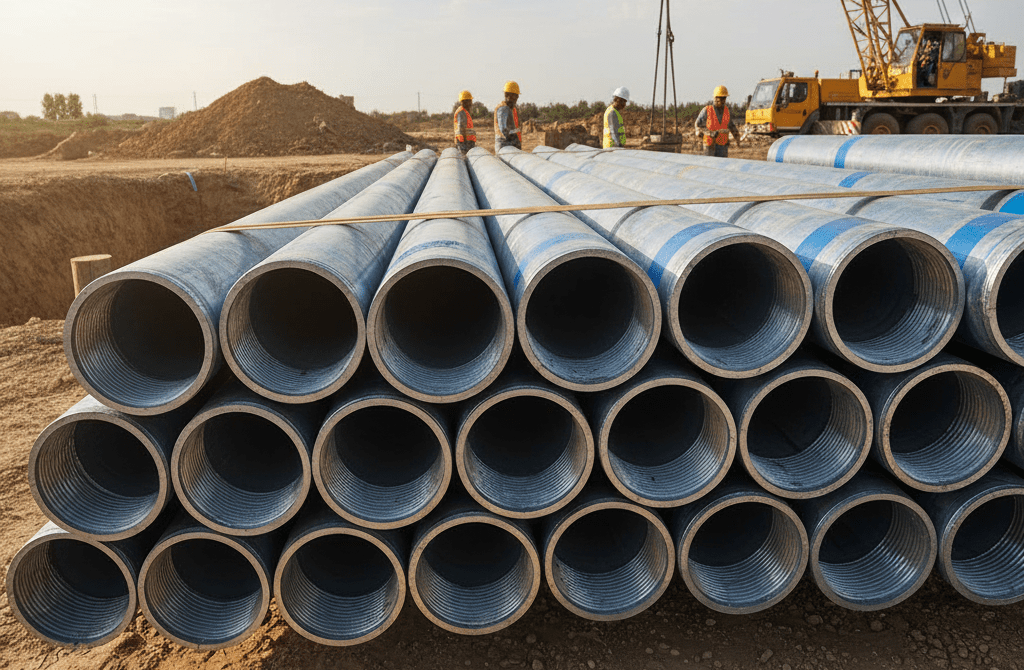Steel and Iron Products
Steel Tubes Used for Water Wells
Strategic Recommendations for Steel Tubes Used for Water Wells – IS 4270:2001
- Start BIS Certification Immediately
Apply for BIS certification under IS 4270:2001 without delay to meet ongoing compliance and avoid penalties. - Engage ERA Compliance Experts
ERA’s technical experts can assist with BIS applications, product testing, ISI marking, and audit preparation for smooth certification. - Reach Out for Support
📧 cs@eraglobal.co.in | 📞 +91 9599296331 | 💬 WhatsApp: For assistance with BIS certification, product testing, or inspection documentation. - Ensure ISI Marking & Test Certification
All steel tubes must bear the ISI mark and hold a valid BIS test certificate before sale or distribution. Non-conforming materials should be scrapped as per BIS provisions. - Track QCO Updates & Subscribe ERA Newsletter
Stay informed about updates to the Steel Tubes QCO, amendments, or BIS circulars by subscribing to ERA’s regulatory newsletter.

| Section | Details |
|---|---|
| Product Name | Steel Tubes Used for Water Wells |
| Applicable Indian Standard (IS) No | IS 4270:2001 |
| Title of Indian Standard | Steel Tubes Used for Water Wells – Specification |
| Quality Control Order | Steel Tubes (Quality Control) Order, 2020 |
| Notification & Amendments | • Original QCO: S.O. 281(E), dated 21st January 2020 • Supersedes: G.S.R. 374(E), dated 18th July 1978 (Mild Steel Tubes QCO, 1978) |
| Final Enforcement Date | 1st August 2020 |
| Objective & Scope | To ensure the quality, dimensional accuracy, and performance of steel tubes used for water well construction and related applications. |
| Products Covered | Seam-welded and plain-ended steel tubes used in drilling, casing, and lining of water wells up to specified diameters as per IS 4270:2001. |
| Exemptions | Products manufactured exclusively for export are exempt. |
| Industries Impacted | Water well drilling, borewell pipe manufacturers, agricultural irrigation systems, and public water supply projects. |
| Mandatory Compliance | Manufacturers must obtain BIS Certification under Scheme-I (ISI Marking) as per BIS (Conformity Assessment) Regulations, 2018. |
| Next Steps for Stakeholders | Apply for BIS license, conduct lab testing in BIS-recognized labs, and ensure ISI marking before sale or distribution in India. |
| Legal Framework Provision & Enforcement | Governed under the BIS Act, 2016; enforced by the Bureau of Indian Standards (BIS). |
| Penalties | Manufacturing or sale without BIS license or ISI marking may attract penalties, prosecution, or product seizure under the BIS Act, 2016. |
| Supersession & Amendment Clause | Supersedes earlier QCO (S.O. 574(E), dated 5th February 2024). Any future BIS amendments to IS 3930:1994 will automatically apply. |
| Conclusion | From 1 August 2020, BIS certification under IS 4270:2001 is mandatory for steel tubes used in water wells. This ensures the safety and structural integrity of groundwater systems. Non-compliance may lead to heavy fines, seizure of goods, and legal action. |
Ready to start your certification journey?
Let us help you navigate regulatory challenges and achieve certification with ease. Leave us your details, and we’ll get back to you—or request a free consultation today.
Get in touch with us today
Notification
Steel Tubes Used for Water Wells – IS 4270:2001 is covered under the Steel Tubes (Quality Control) Order, 2020, notified via S.O. 281(E) dated 21st January 2020 by the Ministry of Commerce and Industry (DPIIT). The Order supersedes the earlier Mild Steel Tubes (Quality Control) Order, 1978 and came into force on 1st August 2020.
Enforcement Timeline
Effective from 1st August 2020, non-compliant products cannot be legally sold or distributed after this date.
Overview
This regulation mandates the quality control and BIS certification for steel tubes intended for water well applications. The move ensures that all tubes meet the required strength, dimensional, and corrosion resistance properties.
Objective & Scope
The Order aims to ensure that only high-quality, reliable, and safe steel tubes are used in water well drilling and casing to prevent failures or contamination risks.
Products Covered
The standard covers seam-welded steel tubes for water wells with specific wall thickness and mechanical strength suitable for sub-surface applications, as defined under IS 4270:2001.
Exemptions Provided
Steel tubes manufactured solely for export purposes are exempt from this Order.
Industries Impacted
This regulation impacts manufacturers, borewell contractors, irrigation system suppliers, and infrastructure agencies involved in water extraction and supply systems.
Mandatory Compliance Requirements
All manufacturers must obtain a BIS license under Scheme-I (ISI Marking) and ensure products conform to IS 4270:2001. Only BIS-certified tubes can be manufactured, stored, or sold in India.
Next Steps for Stakeholders
- Manufacturers must immediately apply for BIS certification.
- Production should begin only after receiving a valid licence.
- Dealers, suppliers, and government procurement agencies must verify BIS marking and certification before purchase or use.
- Non-compliant stock must be cleared or upgraded before the enforcement date.
Legal Provisions, Enforcement & Penalties
This Order is backed by legal provisions under the BIS Act, 2016, specifically:
- Section 16 (Power to issue Quality Control Orders) and,
- Section 25(3) (Enforcement and penalties for non-compliance).
The Bureau of Indian Standards (BIS) is the designated certifying and enforcement authority.
Penalties for non-compliance include:
- First offence: Fine up to ₹2,00,000.
- Subsequent offences: Fine up to ₹5,00,000 and/or imprisonment up to 2 years.
- Additional actions: Product seizure, cancellation of BIS licence, and legal prosecution under the Criminal Procedure Code (CrPC).
Conclusion
From 1 August 2020, it is mandatory that all steel tubes used for water wells conform to IS 4270:2001 and bear the ISI mark. The Quality Control Order ensures that water well infrastructure is supported by durable and compliant materials, reducing the risk of groundwater contamination and equipment failure. Stakeholders must ensure timely compliance to avoid severe financial and legal penalties.
Ready to start your certification journey?
Let us help you navigate regulatory challenges and achieve certification with ease. Leave us your details, and we’ll get back to you—or request a free consultation today.
